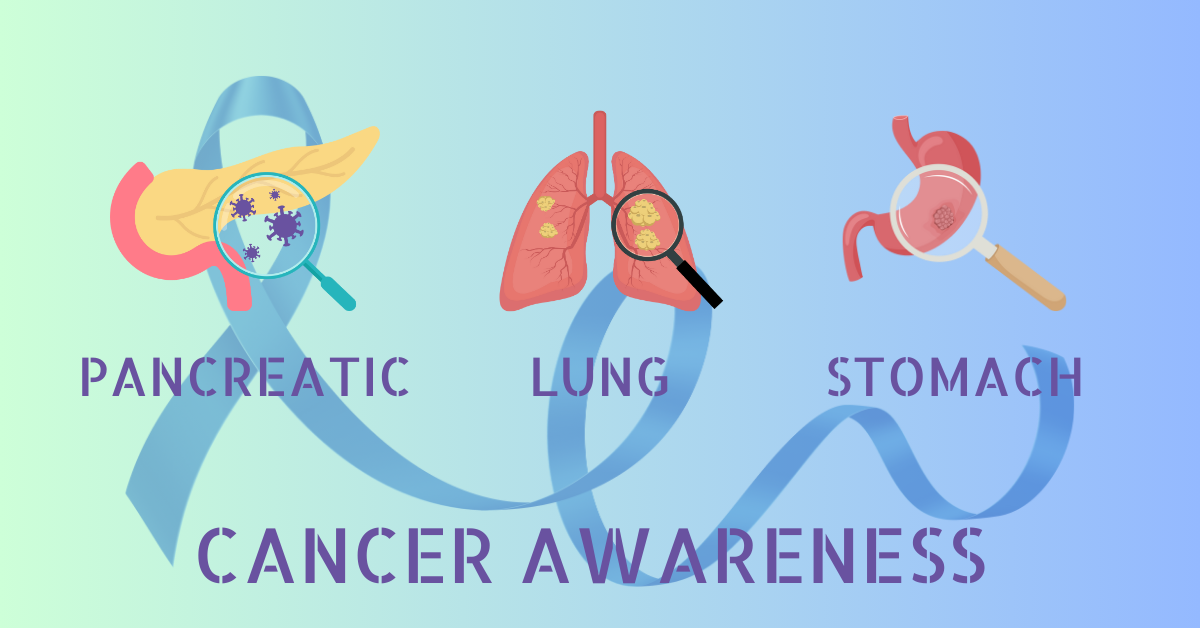

Pancreatic, Lung, and Stomach Cancer Awareness
1st Dec, 2023Raising awareness for the various cancer types impacting millions globally involves comprehensive efforts to inform, educate, and engage individuals across diverse communities. Let us go through the various cancer types and its facts.
Pancreatic Cancer:
Pancreatic cancer occurs when cells in the pancreas start to grow uncontrollably, forming a tumor. Pancreatic cancer symptoms include abdominal pain, jaundice, weight loss, and digestive issues. It often remains undetected until it reaches an advanced stage because it may not cause noticeable symptoms, making it one of the most challenging cancers to treat.
Pancreatic cancer accounts for about 3% of all cancers globally & about 0.5% of all cancer cases in India. It is the 7th leading cause of cancer-related deaths worldwide.
The awareness generated during Pancreatic Cancer Awareness Month is crucial in encouraging early diagnosis, supporting patients and their families, advocating for research funding, and fostering hope for improved treatments and outcomes for those affected by this challenging disease.
Lung Cancer:
As one of the most prevalent cancers globally, with 2.2 million new cases diagnosed each year, lung cancer claims a significant number of lives each year. Lung cancer is a type of cancer that occurs when cells in the lungs grow abnormally and form a tumor. The leading cause is often attributed to smoking, although non-smokers can also develop this cancer due to various factors like exposure to secondhand smoke, environmental pollutants, or genetic predispositions. It is one of the most common cancers in India as well, with a high mortality rate. Around 70-90% of lung cancer cases in India are attributable to tobacco smoking.
Diagnosis often involves imaging tests such as chest X-rays or CT scans, as well as biopsies to examine tissue samples for the presence of cancer cells.
Lung cancer awareness aims to encourage people to quit smoking, raise awareness about early lung cancer symptoms such as persistent coughing or shortness of breath, and highlight advancements in treatment options, including targeted therapies and immunotherapy.
Stomach Cancer:
Stomach cancer, though less common than lung or pancreatic cancer, still poses a considerable threat to health. Also known as gastric cancer, it refers to the development of malignant cells in the lining of the stomach. Stomach cancer symptoms can often mimic common stomach ailments, leading to delayed diagnoses. Factors such as diet, family history, and certain infections like H. pylori bacteria can increase the risk of developing stomach cancer. Globally, stomach cancer ranks 4th as a leading cause of cancer-related deaths, while in India, 3rd among the causes of such fatalities.
Awareness initiatives aim to educate individuals about these risk factors, enhancing survival rates by emphasizing the importance of regular screenings and promoting healthier lifestyle choices to reduce the chances of developing this cancer.
In conclusion, this stands as an opportunity to emphasize the significance of research, preventive measures, and ensuring access to high-quality care for individuals affected by stomach, lung, and pancreatic cancers.


